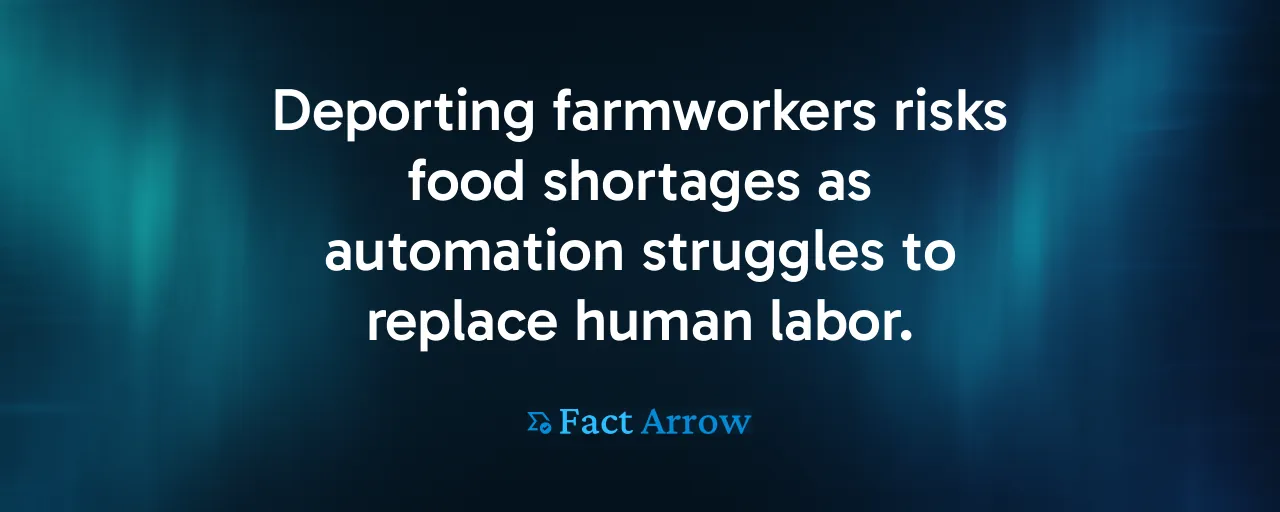A Policy That Could Upend Our Food System
A recent proposal to deport millions of undocumented farmworkers has sparked fierce debate. Agriculture Secretary Brooke Rollins, defending the plan, argued that automation and millions of Medicaid-enrolled adults could replace these workers. Her comments raise urgent questions about the future of America's food supply. The idea hinges on bold assumptions about technology and domestic labor, and it carries real risks of empty grocery shelves, soaring prices, and struggling rural towns.
Farmworkers, many of whom are immigrants, harvest the fruits, vegetables, and dairy that feed the nation. Removing them overnight could disrupt the delicate balance of agriculture, an industry already strained by climate challenges and tight margins. The plan's supporters see it as a way to prioritize American workers and modernize farming, but the reality on the ground tells a different story, one rooted in human contributions and economic necessity.
The Human Backbone of Agriculture
Immigrant workers are the lifeblood of U.S. agriculture. According to Farmworker Justice, 70 percent of field laborers are immigrants, with nearly half lacking legal status. These workers pick strawberries, milk cows, and process meat, often in grueling conditions for low wages. Their expertise ensures food reaches our tables affordably. Deporting them would disrupt lives and threaten the stability of entire rural economies dependent on their labor and spending.
Small farms, in particular, rely on this workforce. A Farm Bureau study warns that removing undocumented labor could cause a five-to-six percent rise in food prices, with milk prices potentially jumping 90 percent. For low-income families, already stretched thin, such increases would hit hard. The ripple effects could shutter farms, reduce exports, and reshape rural communities, where migrant workers are neighbors and essential laborers.
Automation's Promise and Its Limits
Rollins pointed to automation as a solution, citing robots that can harvest crops or manage dairy operations. The agricultural technology market is growing, valued at over $22 billion in 2025, with a 14 percent annual increase. Innovations like precision harvesters and weeding machines are impressive, but they can only partially replace human hands. Academic research shows high capital costs and limited compatibility with delicate crops like strawberries, where robots achieve only 60 percent of human picking speed.
Transitioning to automation requires time, money, and infrastructure that many small farms lack. Large operations might afford million-dollar machines, but family farms, which produce much of our fresh produce, face a tougher road. Without a gradual shift, including public investment in research and training, automation remains a distant fix rather than an immediate answer to a sudden labor shortage.
The Myth of 'Able-Bodied' Workers
Rollins also claimed that 34 million able-bodied Medicaid-enrolled adults could fill farm jobs. This framing ignores the realities of their lives, including health issues, childcare needs, and geographic distance from rural farms. Research shows most Medicaid recipients already work, attend school, or care for dependents. Many live far from rural farms, lacking transportation or housing to relocate for seasonal work. Health issues, childcare needs, and the physical demands of farm labor further limit their ability to step in.
Historical efforts to redirect domestic workers to agriculture, like post-Bracero Program initiatives, often faltered due to these barriers. Forcing people into low-wage, unstable jobs without support risks deeper poverty and instability. Instead, targeted training programs and mobility grants could help willing workers transition, but only with careful planning and resources.
A Legacy of Labor and Reform
America's agricultural labor debates are not new. The Bracero Program of the 1940s to 1960s brought millions of Mexican workers to U.S. farms, followed by the 1986 Immigration Reform and Control Act, which legalized many. These cycles of reliance and restriction consistently reveal that immigrant workers are essential. Recent history, from Obama's restrained enforcement to Trump's sporadic raids, shows that heavy-handed policies disrupt without solving.
Today's proposal echoes past mistakes but at a larger scale. The Trump administration's brief pause on farm raids in June 2025, after industry outcry, suggests even supporters see risks. A balanced approach would learn from history, prioritizing workers' contributions over punitive measures.
Solutions Rooted in Fairness
Protecting America's food supply demands practical, humane policies. Legalizing experienced farmworkers through bills like the Farm Workforce Modernization Act would stabilize the industry and honor their contributions. Stronger labor standards, including fair wages and safe conditions, would attract more workers, immigrant and citizen alike. Publicly funded training could prepare domestic workers for modern farm roles, while research grants could accelerate automation without displacing people abruptly.
Comprehensive immigration reform, pairing legal status with gradual modernization, offers a path forward. Pilot programs for Medicaid work requirements could succeed, but only with transportation, childcare, and housing support. These steps prioritize people, from workers to consumers, ensuring no one is left behind.
A Future Worth Building
The proposal to deport farmworkers tests our values. Food security, fairness, and economic stability hang in the balance. Policies that tear families apart or destabilize rural communities solve nothing. Instead, we can choose a system that rewards hard work, invests in innovation, and respects the dignity of those who feed us.
By legalizing workers, strengthening labor protections, and supporting a gradual shift to automation, America can secure its farms for generations. This approach aligns with our shared need for affordable food and thriving communities. It's a vision that lifts everyone, from field to table.
The debate sparked by Rollins's words is a chance to act. Let's build a food system that works for all, rooted in justice and pragmatism, and avoid policies that risk empty shelves and broken lives.
